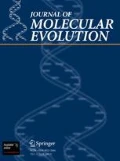Abstract
In a recent Letter, Di Giulio questions the use of the term ‘neutral’ when describing the process by which error minimization may have arisen as a side-product of genetic code expansion, resulting from the addition of similar amino acids to similar codons (Di Giulio, in J Mol Evol 86(9):593–597, 2018). However, I point out that in this scenario error minimization is non-adaptive, and so ‘neutral’ is an appropriate term to describe its imperviousness to direct selection. Error minimization is a form of mutational robustness, and so commonly viewed as beneficial. This in turn implies that not all beneficial traits may be adaptations generated by direct selection for that trait.
References
Atay FM, Jost J (2004) On the emergence of complex systems on the basis of the coordination of complex behaviors of their elements. Complexity 10:17–22
De Visser JAGM et al (2003) Perspective: evoilution and detectiong of genetic robustness. Evolution 57:1959–1972
Di Giulio M (2018) A non-neutral origin for error minimization in the origin of the genetic code. J Mol Evol 86(9):593–597
Epstein CJ (1966) Role of the amino-acid ‘‘code’’ and of selection for conformation in the evolution of proteins. Nature 210:26–28
Goldberg AL, Wittes RE (1966) Genetic code: aspects of organization. Science 153:420–424
Gould SJ, Lewontin RC (1979) The spandrels of San Marco and the Panglossian paradigm: a critique of the adaptationist programme. Proc R Soc Lond B 205:581–598
Hughes AL, Friedman R (2005) Gene duplication and the properties of biological networks. J Mol Evol 61:758–764
Jee J, Sundstrom A, Massey SE, Mishra B (2013) What can information-asymmetric games tell us about the context of Crick’s “Frozen Accident”?. J R Soc Interface 10:20130614
Kimura M (1968) Evolutionary rate at the molecular level. Nature 217:624–626
King JL, Jukes TH (1969) Non-Darwinian evolution. Science 164:788–798
Koonin EV (2016) Splendor and misery of adaptation, or the importance of neutral null for understanding evolution. BMC Biol 14:114
Koonin EV, Novozhilov AS (2017) Origin and evolution of the universal genetic code. Ann Rev Genet 51:45–62
Massey SE (2008) A neutral origin for error minimization in the genetic code. J Mol Evol 67:510–516
Massey SE (2010) Searching of code space for an error-minimized genetic code via codon capture leads to failure, or requires at least 20 improving codon reassignments via the ambiguous intermediate mechanism. J Mol Evol 70:106–115
Massey SE (2015) Genetic code evolution reveals the neutral emergence of mutational robustness, and information as an evolutionary constraint. Life 5:1301–1332
Massey SE (2016) The neutral emergence of error minimized genetic codes superior to the standard genetic code. J Theor Biol 408:237–242
Massey SE (2018) How to ‘find’ an error minimized genetic code: neutral emergence as an alternative to direct Darwinian selection for evolutionary optimization. Nat Comput. https://doi.org/10.1007/s11047-017-9669-3
Massey SE, Mishra B (2018) Origin of biomolecular games: deception and molecular evolution. J R Soc Interface 15:20180429
Nei M (2006) Selectionism and neutralism in molecular evolution. Mol Biol Evol 22:2318–2342
Ohta T (1973) Slightly deleterious mutant substitutions in evolution. Nature 246:96–98
Pasteur L (1874) L. Pasteur présente quelques observations sur les forces dissymétriques naturelles. C R Acad Sci 1874:1515–1518
Siddiq MA, Hochberg GKA, Thornton JW (2017) Evolution of protein specificity: insights from ancestral protein reconstruction. Curr Opin Struct Biol 47:113–122
Sonneborn TM (1965) Degeneracy of the genetic code: extent, nature, and genetic implication. In: Bryson V, Vogel HJ (ed) Evolving genes and proteins. Academic Press, New York
Stoltzfus A (1999) On the possibility of constructive neutral evolution. J Mol Evol 49:169–181
Woese CR (1965) On the evolution of the genetic code. Proc Natl Acad Sci USA 54:1546–1552
Wong JT (1975) A co-evolution theory of the genetic code. Proc Natl Acad Sci USA 72:1909–1912
Author information
Authors and Affiliations
Corresponding author
Rights and permissions
About this article
Cite this article
Massey, S.E. Genetic Code Error Minimization as a Non-Adaptive But Beneficial Trait. J Mol Evol 87, 4–6 (2019). https://doi.org/10.1007/s00239-018-9880-6
Received:
Accepted:
Published:
Issue Date:
DOI: https://doi.org/10.1007/s00239-018-9880-6

